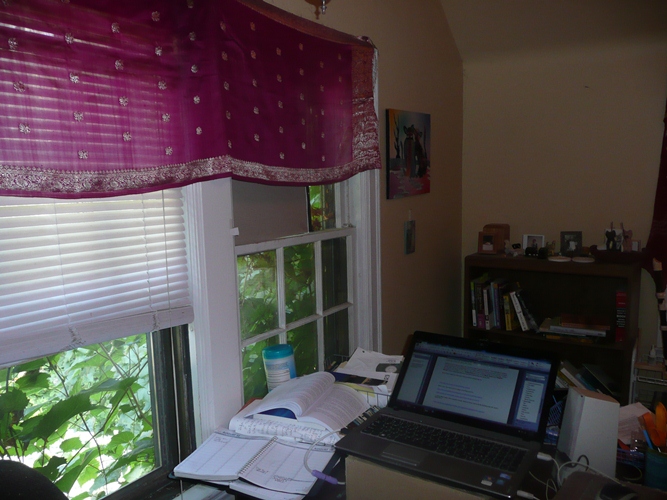 Last week, I wrote about one of the most important things you need if you want to create and maintain a sacred writing practice: Time.
Last week, I wrote about one of the most important things you need if you want to create and maintain a sacred writing practice: Time.
Today, I’m going to say a few words about another of the essentials: Space.
I have tried in the past to write about writing spaces—the components of a writing space, what they should and shouldn’t be, how to make a space that works for you—and have always been a bit stymied. The problem is that writing spaces are so very individual. What each person needs and wants is utterly unique.
“The ultimate in writing spaces seems to be the writing shed,” writes the editor of themillions.com, “a spare, distraction-free room set in some verdant landscape, where, in fertile solitude, the writer may create worlds out of nothing.”
But is that really the ultimate? Many writers prefer noisy cafes, rooms full of activity, shambolic offices, libraries, living rooms, beds, or even bathrooms. I’ve known authors who produced tons of material while their children played around their legs, and others who penned poems in the ladies’ room during their work breaks. Although necessity may guide some of these choices, I don’t think I’m going too far out on a limb to say many writers prefer these spaces to the “ultimate” one described above.
In A Perfect Mess, Eric Abrahamson and David H. Freedman slam the idea that our work areas need to be free of distraction and clutter.They claim order is neither necessary nor beneficial and declare the industry that has grown up around helping people get organized a sham. Mess, they say, permits organizations to be more flexible, allows for greater diversity, creates more harmony with the immediate environment, and makes systems more resistant to failure and destruction.
Judging from the writers’ desks and offices I’ve seen over the years—including, of course, my own—I’d have to agree that mess has benefits. But reactions to Abrahamson and Freedman’s ideas have been mixed. And, when I once posted a series of articles about the advantages of chaos, I got some angry responses from writers who said they detested messy houses and cluttered rooms.
When I think about the spirituality of places, including writing spaces, I keeping coming back to memories of a couple I knew when I lived in Central California. They were blissfully married, very much in love, and both very spiritual. Tom was a Zen Buddhist. His way of being in the world was minimalist and simple. He liked spaces that were spare and unadorned. Mary, on the other hand, was a Pagan. Every where she went—even if she was spending a single night in a hotel—she would create a lavish altar festooned with stones, shells, mirrors, bells, bowls, feathers, pictures, coins, fruits, and flowers. Two different personalities, two different varieties of spirituality, two types of sacred space, each as valid as the other.
What type of writing space do you prefer? Where do you write? Share it here.
For some pictures of different writing spaces, check out these links:
http://www.pw.org/content/writing_spaces
http://jennykellerford.wordpress.com/about/my-writing-space/
http://www.jackeeholder.com/coaching/a-perfect-mess-2/
http://writeplacewritetime.tumblr.com/post/7081334543/edan-lepucki
And, for a wonderful read, check out A Perfect Mess: The Hidden Benefits of Disorder—How Creammed Closets, Cluttered Offices, and On-th-Fly Planning Make the World a Better Place by Eric Abrahamson and David H. Freedman
I have to say I do agree with Abrahamson and Freedman: I can only write in my perfect mess. My desk and my study room are full of stuff, papers, pens and books. Without them around I simply can’t write: it seems like my creativity blows away. But that’s just me: if I can’t write in a perfect, tidy environment it means that I’m neither perfect nor tidy and I need m space to just reflect my soul.
You are not alone, Elisabetta! I think most (though not all) writers find more creativity in a mess than in organization. As long as it works for you, it’s perfect.